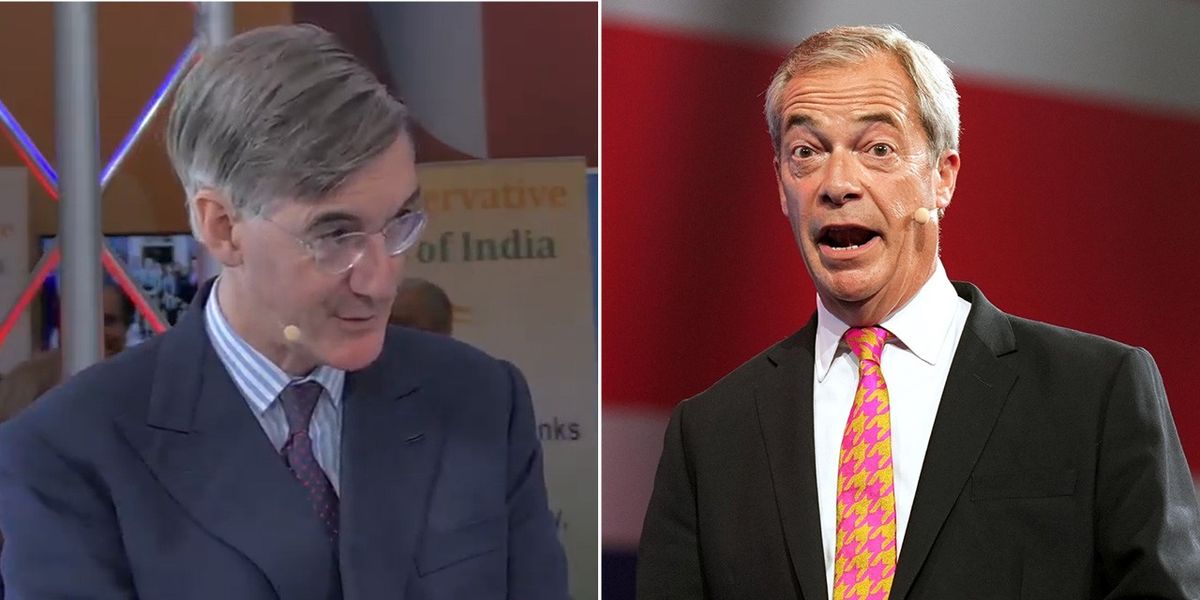The Rising Tensions Between Conservatives and Reform UK: A Political Showdown
In the midst of a heated political landscape, the annual Conservative Party conference in Birmingham has become a battleground for ideological clashes, particularly between the traditional Conservative Party and the upstart Reform UK, led by the controversial figure Nigel Farage. As leadership hopefuls within the Conservative Party take aim at Farage, one prominent voice has emerged in his defense: former Conservative MP Sir Jacob Rees-Mogg.
A Divided Party
The Conservative Party is currently grappling with its identity and electoral strategy, especially after a disappointing performance in the recent general election. James Cleverly, a key figure in the party, did not hold back during his address, labeling Reform UK as "pale imitators" of the Conservatives and expressing his intent to "destroy" them. This aggressive rhetoric highlights the growing concern within the party about the potential threat posed by Reform UK, which has been siphoning off traditional Conservative voters.
In stark contrast, Rees-Mogg has taken a more reflective stance. He argues that the Conservatives’ electoral woes are largely self-inflicted, stating, "It’s our fault, not Reform’s." This perspective underscores a critical point: the Conservative Party must confront its failures rather than deflect blame onto competing parties.
The Case for Reform UK
Rees-Mogg’s defense of Farage is rooted in a recognition of the shifting political landscape. He pointed out that Reform UK has gained traction in constituencies where the Conservatives have lost ground, particularly noting that in 89 seats, Reform came in second to Labour. This observation raises an important question: should the Conservatives be fighting against Reform UK, or should they be more concerned about the prospect of Labour regaining power?
Rees-Mogg’s comments suggest a strategic reevaluation is necessary. He posits that the Conservatives should consider collaborating with Reform UK in areas where they are unlikely to win, rather than engaging in a divisive campaign that could ultimately benefit Labour. This pragmatic approach highlights the need for the party to adapt to the realities of the current political climate.
The Challenge of Voter Discontent
One of the most pressing issues facing the Conservative Party is the loss of support from former loyalists. Rees-Mogg pointed out that approximately four million voters who previously supported the Conservatives chose not to vote in the last election. This significant drop in support indicates a broader discontent with the party’s direction and policies.
Rees-Mogg emphasized that the party does not have an inherent right to these votes; rather, it must earn them back by addressing the concerns of its constituents. He noted that many former Conservative voters are now attracted to Reform UK because they feel their issues—such as immigration and economic policy—are not being adequately addressed by the current Conservative leadership.
The Net Zero Debate
A key area of contention is the Conservative Party’s stance on net zero policies. Rees-Mogg has been vocal about the need for a reassessment of these policies, arguing that they are making the country "cold and poor." He believes that the party’s commitment to aggressive environmental policies is alienating voters who are concerned about rising energy costs and economic stability.
Rees-Mogg’s assertion that "governing by opinion polls" is a flawed strategy resonates with many who feel that the party has lost touch with the everyday realities faced by voters. He argues that while people may express support for environmental initiatives, they are less enthusiastic when confronted with the financial implications of such policies.
Looking Ahead
As the Conservative Party navigates this turbulent political landscape, the relationship with Reform UK will be crucial. Rees-Mogg’s insights suggest that the party must engage in introspection and adapt its policies to regain the trust of disillusioned voters. The upcoming years will be pivotal as the Conservatives seek to redefine their identity and strategy in the face of a formidable opponent in Farage and his Reform UK party.
In conclusion, the tensions between the Conservative Party and Reform UK reflect deeper issues within British politics. As the party grapples with its electoral identity, the voices of figures like Jacob Rees-Mogg will be essential in shaping its future direction. The question remains: can the Conservatives reclaim their lost support, or will they continue to see their base erode in favor of Reform UK? The answer may well determine the outcome of the next general election.
